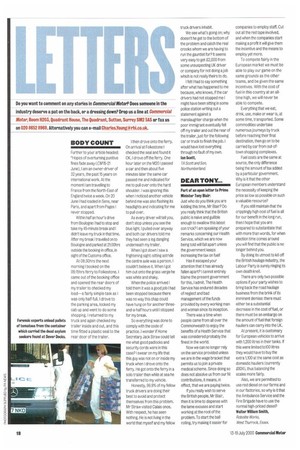DEAR TONY...
Page 20

If you've noticed an error in this article please click here to report it so we can fix it.
Part of an open letter to Prime Minister Tony Blair: Just who do you think you are kidding this time, Mr Blair? Do you really think that the British public is naive and gullible enough to swallow this latest con trick? lam speaking of your remarks concerning our Health Service, which we are now being told will fall apart unless the government keeps increasing the tax on fuel!
Has it escaped your attention that it has already fallen apart? I cannot entirely blame the present government for this, I admit. The Health Service has endured decades of neglect and bad management of the funds provided by every working man and woman since its inception.
There was a time when people came from all over the Commonwealth to el-0y the benefits of a Health Service that was considered probably the finest in the world.
Now we can no longer rely on the service provided unless we are in the wage bracket that permits us to join a private medical scheme. Since doing so does not absolve us from our NI contributions, it means, in effect, that we are paying twice.
If you really wish to serve the British people, Mr Blair, then it is time to dispense with the lame excuses and start working at the root of the problem. To start the ball rolling, try making it easier for companies to employ staff. Cut out all the red tape involved, and when the companies start making a profit it will give them the incentive and the means to employ yet more.
To compete fairly in the European market we must be able to play our game on the same grounds as the other teams, and be given the same incentives. With the cost of fuel in this country at an alltime high, we will never be able to compete.
Everything that we eat, drink, use, make or wear is, at some time, transported. Some commodities undertake numerous journeys by truck before reaching their final destination, then go on to be carried by car from out-oftown shopping complexes.
Fuel costs are the same at source, the only difference being the amount of tax added by a particular government. Why is it that the other European members understand the necessity of keeping the price as low as possible on such a valuable resource?
If you still maintain that the cripphngly high cost of fuel is all for our benefit in the long run, then I hope that you are prepared to substantiate that with more than words, for when election time comes around you will find that the public is no longer behind you.
By doing its utmost to kill off the British haulage industry, the Labour Party is surely ringing its own death knell.
There are only two possible options if your party wishes to bring back the road haulage business from the brink of its imminent demise: there must either be a substantial decrease in the cost of fuel, or there must be an embargo on the amount of fuel that foreign hauliers can carry into the UK.
At present, it is customary for European vehicles to arrive with 1,200 litres in their tanks. If this were limited to100 litres they would have to buy the extra 1,100 at the same cost as domestic hauliers (currently 2924), thus balancing the scales more fairly.
Also, we are permitted to use red diesel on our farms and in our factories, so why is it that the Ambulance Service and the Fire Brigade have to use the normal high-priced diesel? Wetter William Smith Robolite Works, West Thurrook, Essex.




































































































